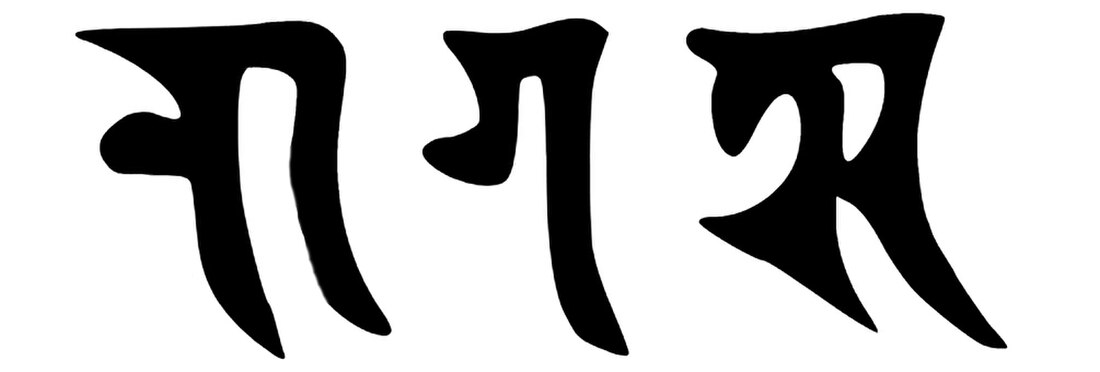Nāgarī script
Abugida From Wikipedia, the free encyclopedia
The Nāgarī script is the ancestor of Devanagari, Nandinagari and other variants, and was first used to write Prakrit and Sanskrit. The term is sometimes used as a synonym for Devanagari script.[7][8][9] It came in vogue during the first millennium CE.[10]
| Nāgarī | |
|---|---|
 The word Nāgarī in the Nāgarī script. | |
| Script type | |
Time period | 7th century CE |
| Languages | |
| Related scripts | |
Parent systems | |
Child systems | |
Sister systems | Bengali-Assamese script, Odia script,[2] Nepalese |

The Nāgarī script has roots in the ancient Brahmi script family.[9] The Nāgarī script was in regular use by 7th century CE, and had fully evolved into Devanagari and Nandinagari scripts by about the end of first millennium of the common era.[8][11][12]
Etymology
Nagari is a vṛddhi derivation from नगर (nagara), which means city.[13]
Origins
The Nāgarī script appeared in ancient India as a central-eastern variant of the Gupta script (whereas Śāradā was the western variety and Siddham was the far eastern variety). In turn it branched off into several scripts, such as Devanagari and Nandinagari.[citation needed]
Usage outside India
The 7th century Tibetan king Songtsen Gampo ordered that all foreign books be transcribed into the Tibetan language, and sent his ambassador Tonmi Sambota to India to acquire alphabetic and writing methods, who returned with a Sanskrit Nāgarī script from Kashmir corresponding to twenty-four (24) Tibetan sounds and innovating new symbols for six (6) local sounds.[14]
The museum in Mrauk-u (Mrohaung) in the Rakhine state of Myanmar held in 1972 two examples of Nāgarī script. Archaeologist Aung Thaw describes these inscriptions, associated with the Chandra, or Candra, dynasty that first hailed from the ancient Indian city of Vesáli:[15]
... epigraphs in mixed Sanskrit and Pali in North-eastern Nāgarī script of the 6th century dedicated by [Queen] Niti Candra and [King] Vira Candra
— Aung Thaw, Historical sites in Burma (1972)
- Coppern plates in Nāgarī script, 1035 CE
- Nagari Script 01
- Nagari Script 02
See also
References
Wikiwand - on
Seamless Wikipedia browsing. On steroids.



